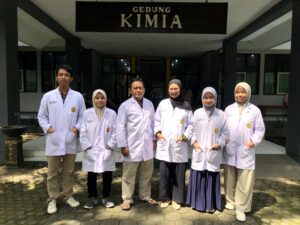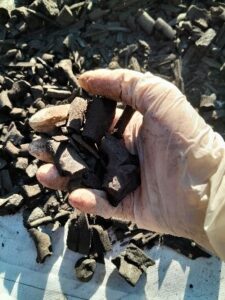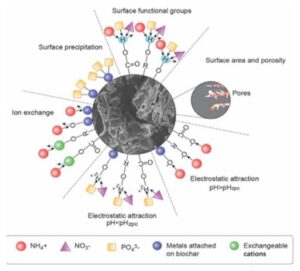 Tobacco is one of the leading commodities in Jember Regency, East Java. So far, tobacco stem waste has not been widely used by the community. Tobacco sticks are usually just thrown away or buried in the ground. Tobichan created a new innovation where tobacco stem waste is converted into modified biochar through ion exchange of Fe compounds to obtain biochar with high nitrate absorption capacity.
Tobacco is one of the leading commodities in Jember Regency, East Java. So far, tobacco stem waste has not been widely used by the community. Tobacco sticks are usually just thrown away or buried in the ground. Tobichan created a new innovation where tobacco stem waste is converted into modified biochar through ion exchange of Fe compounds to obtain biochar with high nitrate absorption capacity.
Modifikasi Biochar dari Limbah Batang Tembakau Untuk Meningkatkan Kapasitas Adsorpsi Nitrat Dalam Air was developed by the PKM-RE team, Faculty of Mathematics and Natural Sciences, University of Jember, often referred to as TOBICHAN’s Team. TOBICHAN’s team consists of 5 students from the UNEJ Faculty of Mathematics and Natural Sciences, namely Inggrit Ayuningtyas, Sultan Adil Lanang Sejati, Desi Fitrianingsih Nst., Ifa Inayatul Fauziah, and Fatma Astri Aini, accompanied by a lecturer from the Chemistry Department, FMIPA UNEJ, namely Dr. Bambang Piluharto, S.Si., M.Si.
Biochar is a process of transforming biomass into active carbon with a porous structure obtained from a pyrolysis process or combustion without oxygen. Making modified biochar consists of several stages. The first stage is material preparation where the tobacco stem waste is washed clean and then dried by drying it in the sun for several days. The dried tobacco stems are then placed in a pyrolysis device at a temperature of 400℃ for 4 hours. The pyrolysis process produces biochar which will later be modified and used in agriculture.
Biochar obtained from the pyrolysis process is then activated and modified to increase its adsorption capacity for nitrate. The activation and modification process goes through several stages where the biochar resulting from pyrolysis is soaked with HCl as an activator which is then dried and soaked again with FeCl3.6H2O as an anion exchange compound to obtain biochar with a high adsorption capacity for nitrates.
This research shows that modified biochar has a very high adsorption capacity compared to untreated biochar. Modified biochar has a two-fold higher adsorption capacity for nitrate than unmodified biochar. With this research, it is hoped that the results obtained can be utilized and developed further, especially in the agricultural sector as an absorber of nitrate contained in fertilizer so that nitrate does not dissolve in water and minimizes the use of fertilizer on plants.


